Molecular orbital theory - Samenvattingen en Aantekeningen
Op zoek naar een samenvatting over Molecular orbital theory? Op deze pagina vind je 209 samenvattingen over Molecular orbital theory.
Pagina 3 van de 209 resultaten
Sorteer op
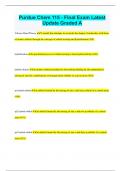
-
Purdue Chem 115 - Final Exam Latest Update Graded A
- Tentamen (uitwerkingen) • 29 pagina's • 2024
- Ook in voordeelbundel
-
 StellarScores
StellarScores
-
- $9.99
- + meer info
Purdue Chem 115 - Final Exam Latest Update Graded A Valence Bond Theory A model that attempts to reconcile the shapes of molecules with those of atomic orbitals through the concepts of orbital overlap and hybridization (429). hybridization a postulated process of orbital mixing to form hybrid orbitals (430). hybrid orbitals an atomic orbital postulated to form during binding by the mathematical mixing of specific combinations of nonequivalent orbitals on a given atom (430). sp hybrid...

-
TEST BANK for Organic Chemistry: 4th Edition by David R Klein. INTEGRATED WITH SOLUTIONS MANUAL. (All Chapters 1-27 Q&A)
- Overig • 2150 pagina's • 2024
-
 STUDYGUIDEnTESTBANKS
STUDYGUIDEnTESTBANKS
-
- $22.99
- + meer info
TABLE OF CONTENTS 1 A Review of General Chemistry 1.1 Introduction to Organic Chemistry 1.2 The Structural Theory of Matter 1.3 Electrons, Bonds, and Lewis Structures 1.4 Identifying Formal Charges 1.5 Induction and Polar Covalent Bonds 1.6 Reading Bond-Line Structures 1.7 Atomic Orbitals 1.8 Valence Bond Theory 1.9 Molecular Orbital Theory 1.10 Hybridized Atomic Orbitals 1.11 Predicting Molecular Geometry: VSEPR Theory 1.12 Dipole Moments and Molecular Polarity 1.13 Intermolecular Forces and Ph...
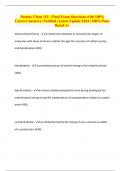
-
Purdue Chem 115 - Final Exam Questions with 100% Correct Answers | Verified | Latest Update 2024 | 100% Pass| Rated A+
- Tentamen (uitwerkingen) • 36 pagina's • 2024
-
Ook in voordeelbundel
-
 Parie
Parie
-
- $9.99
- + meer info
Purdue Chem 115 - Final Exam Questions with 100% Correct Answers | Verified | Latest Update 2024 | 100% Pass| Rated A+ Valence Bond Theory - A model that attempts to reconcile the shapes of molecules with those of atomic orbitals through the concepts of orbital overlap and hybridization (429). hybridization - a postulated process of orbital mixing to form hybrid orbitals (430). hybrid orbitals - an atomic orbital postulated to form during binding by the mathematical mixing of specific combina...
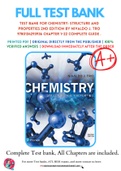
-
Test Bank For Chemistry: Structure and Properties 2nd Edition By Nivaldo J. Tro 9780134293936 Chapter 1-22 Complete Guide .
- Tentamen (uitwerkingen) • 100 pagina's • 2022
-
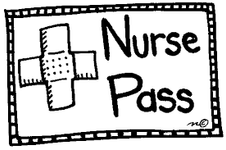 Nursingtest
Nursingtest
-
- $18.48
- 1x verkocht
- + meer info
Test Bank For Chemistry: Structure and Properties 2nd Edition By Nivaldo J. Tro 3936, 2 , 1326, X 1 Atoms 2 The Quantum-Mechanical Model of the Atom 3 Periodic Properties of the Elements 4 Molecules and Compounds 5 Chemical Bonding I Drawing Lewis Structures and Determining Molecular Shapes 6 Chemical Bonding II Valence Bond Theory and Molecular Orbital Theory 7 Chemical Reactions and Chemical Quantities 8 Introduction to Solutions and Aqueous Reactions 9 Thermochemis...
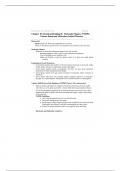
-
Chem 031 Chemical Bonding Notes
- College aantekeningen • 17 pagina's • 2024
- Ook in voordeelbundel
-
 anyiamgeorge19
anyiamgeorge19
-
- $10.99
- + meer info
This is a comprehensive and detailed note on Chapter 10 notes/summary on bonding II which includes molecular shapes, valence bond theory and molecular orbital theory. To your success in academics!!
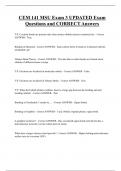
-
CEM 141 MSU Exam 3 UPDATED Exam Questions and CORRECT Answers
- Tentamen (uitwerkingen) • 8 pagina's • 2024
-
 MGRADES
MGRADES
-
- $7.99
- + meer info
CEM 141 MSU Exam 3 UPDATED Exam Questions and CORRECT Answers T/F: Covalent bonds are present only when atomic orbitals interact constructively. - Correct ANSWER- True. Binding in Diamond - Correct ANSWER- Each carbon forms 4 bonds to 4 identical carbons; tetrahedral; sp3 Valence Bond Theory - Correct ANSWER- The idea that covalent bonds are formed when orbitals of different atoms overlap. T/F: Electrons are localized in molecular orbital. - Correct ANSWER- False
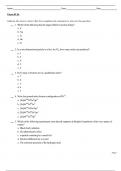
-
Test Bank for Chemical Principles, 8th Edition by Peter Atkins
- Tentamen (uitwerkingen) • 558 pagina's • 2024
-
 StepsSol
StepsSol
-
- $29.49
- + meer info
Test Bank for Chemical Principles: The Quest for Insight 8e 8th Edition by Peter Atkins; Loretta Jones; Leroy Laverman; Kelley Young; James Patterson. Full Chapters are included (Focus 1 to Focus 10 are included) Focus 1: Atoms 1A Investigating atoms 1B Quantum theory 1C Wavefunctions and energy levels 1D The hydrogen atom 1E Many-electron atoms 1F Periodicity Focus 2: Bonds Between Atoms 2A Ionic bonding 2B Covalent bonding 2C Beyond the octet rule 2D The properties of bonds 2...
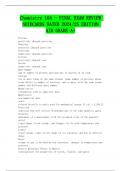
-
Chemistry 104 - FINAL EXAM REVIEW NOTECARDS RATED 2024/25 EDITION AID GRADE A+
- Tentamen (uitwerkingen) • 7 pagina's • 2024
-
 Allan100
Allan100
-
- $7.29
- + meer info
Protons positively charged particles Neutrons neutrally charged particles Electrons negatively charged particles Cations positively charged ions Anions negatively charged ions Mass Number sum of number of protons and neutrons in nucleus of an atom Isotope two or more forms of the same element (same number of protons) whose atoms differ in number of neutrons, and in mass, with the same atomic number and different mass number. Quantitative information such as numerical data Qualita...
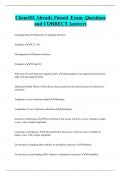
-
Chem101 Already Passed Exam Questions and CORRECT Answers
- Tentamen (uitwerkingen) • 7 pagina's • 2024
-
 MGRADES
MGRADES
-
- $7.99
- + meer info
paramagnetism presence of unpaired electrons Examples P, Ti, NO Diamagnetism paired electrons Examples N2 and O2 Why does O2 stick between magnetic poles? paramagnetic; has unpaired electrons that align with the magnetic field Molecular Orbital Theory a theory that accounts for the allowed states for electrons in molecules Amplitude of wave functions added Bonding
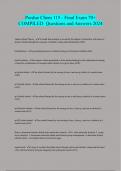
-
Purdue Chem 115 - Final Exam 70+ COMPILED Questions and Answers 2024
- Tentamen (uitwerkingen) • 16 pagina's • 2024
-
 MGRADES
MGRADES
-
- $8.99
- + meer info
Valence Bond Theory - A model that attempts to reconcile the shapes of molecules with those of atomic orbitals through the concepts of orbital overlap and hybridization (429). hybridization - a postulated process of orbital mixing to form hybrid orbitals (430). hybrid orbitals - an atomic orbital postulated to form during binding by the mathematical mixing of specific combinations of nonequivalent orbitals on a given atom (430). sp hybrid orbital - an orbital formed by the mixing of one s...

Hoeveel heb je al uitgegeven op Stuvia? Stel je eens voor dat alle andere studenten JOU betalen voor je samenvatting. Ka-ching! Ontdek alles over verdienen op Stuvia


